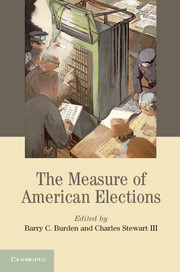Book contents
- Frontmatter
- Contents
- List of figures
- List of tables
- List of contributors
- Acknowledgments
- 1 Introduction to the Measure of American Elections
- 2 Registration and Voting: A View from the Top
- 3 Voter Registration: The Process and Quality of Lists
- 4 Provisional Ballots
- 5 Mail Ballots in the United States: Policy Choice and Administrative Challenges
- 6 Voting from Abroad: Evaluating UOCAVA Voting
- 7 Polling Place Practices and the Voting Experience
- 8 Disability and Election Policies and Practices
- 9 The Performance of Election Machines and the Decline of Residual Votes in the United States
- 10 Voter Confidence as a Metric of Election Performance
- 11 Election Data Transparency
- Appendix
- References
- Index
10 - Voter Confidence as a Metric of Election Performance
Published online by Cambridge University Press: 05 August 2014
- Frontmatter
- Contents
- List of figures
- List of tables
- List of contributors
- Acknowledgments
- 1 Introduction to the Measure of American Elections
- 2 Registration and Voting: A View from the Top
- 3 Voter Registration: The Process and Quality of Lists
- 4 Provisional Ballots
- 5 Mail Ballots in the United States: Policy Choice and Administrative Challenges
- 6 Voting from Abroad: Evaluating UOCAVA Voting
- 7 Polling Place Practices and the Voting Experience
- 8 Disability and Election Policies and Practices
- 9 The Performance of Election Machines and the Decline of Residual Votes in the United States
- 10 Voter Confidence as a Metric of Election Performance
- 11 Election Data Transparency
- Appendix
- References
- Index
Summary
Public confidence in the integrity of the electoral process has independent significance, because it encourages citizen participation in the democratic process.
Justice John Paul Stevens, Crawford v. Marion CountyIn the wake of the major electoral controversies of 2000 and 2004, “voter confidence” has entered the political lexicon and is altering the debate over election reform in this country. Often, voter confidence is used as a political slogan. Voter confidence may not rank with motherhood and apple pie, but surely it’s something that no one opposes. Who, after all, would want a democratic electorate that did not trust the legitimacy of democratic procedures? The title of a major 2004 postelection report, Building Confidence in U.S. Elections, makes no bones about its underlying motive: “polls indicate that many Americans lack confidence in the electoral system.... Building confidence in U.S. elections is central to our nation’s democracy” (Commission on Federal Election Reform 2005, iii). Reporters include “voter confidence” as a theme in stories about elections and election administration. A Lexis-Nexis search from 2001 to 2010 of major U.S. newspapers turned up 1,766 articles using the phrase “voter confidence,” 1,542 mentions of “voter confidence” with “elections,” and 291 mentions of “voter confidence” with either “election reform” or “election administration.”
Policy makers, politicians, and even the Supreme Court were attentive. They believed that voter confidence would respond to reforms in election administration. Writing in 2006, Ray Martinez, then vice chairman of the Federal Election Assistance Commission, bemoaned the erosion of voter confidence:
A Wall Street Journal–NBC News poll, for example, taken shortly after the 2004 presidential election, showed that more than 25% of those surveyed worried that the vote count in the 2004 presidential race was unfair. More recently, the American Bar Association released a nationally commissioned poll showing that some 20% of Americans surveyed have lingering doubts that their vote was accurately counted in the 2004 presidential election (Martinez 2006). Martinez went on to argue for a four point program of reform: election audits, conflict of interest provisions for statewide election administrators, political neutrality requirements for vendors, and disclosure requirements as a condition of voting system certification. These changes, he asserted, would restore voter confidence in the system. …
- Type
- Chapter
- Information
- The Measure of American Elections , pp. 248 - 270Publisher: Cambridge University PressPrint publication year: 2014
- 7
- Cited by



